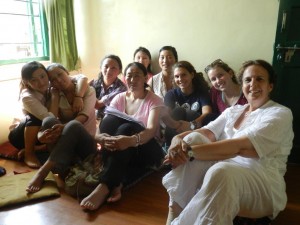Volunteer job at Lha: French Conversation Class
His Holiness the Dalai Lama teaches us about compassion, donating, and doing something useful for the benefit of others in our short life. That is how my daughter and I came to step into the Lha office. At Lha you are received with a big smile, suddenly you are needed! So I stopped my vacation and was recruited, even though French is not my first, nor my second language – that is what was needed. French conversation class gives the students a chance to practice what they have learned and improve their talking skills.
So why should Tibetan women learn French? Let us look at Pema (Pema is not her real name). Pema is 30. Her husband has moved to France to find a better life. If Pema’s dream comes true, her husband will get French papers, and a job, and she will join him and be able to show knowledge of the local language there. I found Pema to be a woman who fights for her dream of a good life, an identify card and a family, and believes in working hard. She gets up every morning at 5am and does 1,000 prostrations (I could not even manage one!). She prays a lot and takes care of the house and at 2pm she comes to Lha for her French lesson, and then at 3 o’clock she joins the conversation class where we sit on the floor in a very small room with no air conditioning and practice speaking French. I don’t know how she does it!
As Israelis, we know what being a refugee means. My father lost his family in Lithuania and came to Israel as an orphan. He started a new life and learned a new language in a new and small country. At that time no one mentioned the word “trauma”, but many Jewish people who had fled from Europe after the Second World War were post traumatic. I was born at the same time my country was born.
I met His Holiness in Israel and have found there are many Israelis who love Tibet. The two nations have much in common with their traumatic pasts.
My daughter Yael started helping with English conversation classes, and said she feels that she is the one who is learning from the Tibetans, rather than the opposite. Every day she learned about their culture, the challenges they went through, and about their hopes and way of life. Finding a connection with the Tibetan community, she started volunteering in a nursery to help Tibetan parents to be free to go to work and thus establish their life in India. Both of us found a new aim in our vacation which was very meaningful for us, finding it very challenging and fulfilling to help others.
There is a Hebrew proverb: “From all my teachers I have learned, but from my students more than all”. I salute each and every one of my students and wish them an easier life and great success. I have learned a great lesson – never stop believing, never stop hoping.





 Print
Print Email
Email













